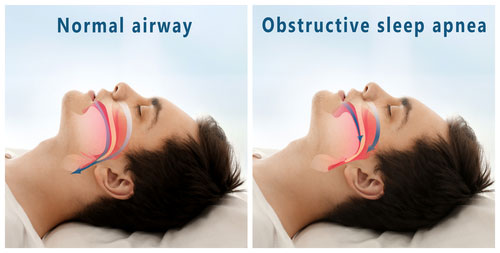
Sleep Apnea
Sleep Apnea, literally means “with‑out breath” in Greek. It is when breathing stops for 10 seconds or more while sleeping.
Signs of Sleep Apnea
- Snoring that may disrupt the sleep of others.
- Gasping, coughing or choking upon wakening
- Waking with your heart racing
- Waking up tired after a full night’s sleep
- Waking up with a headache
- Feeling very sleepy during the day
- Falling asleep without intending to
- Problems with memory or concentration
- Feeling irritable, short-tempered
- Weight gain, inability to lose weight
- Acid Reflux in adults
Left untreated, sleep apnea increases the likelihood of illness or injury. It has been linked to obesity, high blood pressure, strokes, cardiovascular disease, diabetes, and even death.
Serious and life-threatening problems start when sleepers begin experiencing apneas (where breathing stops) and hypopneas (where breathing is shallow due to an obstruction). Breathing is usually blocked in the back of the throat when the tongue and muscles relax during sleep, the lower jaw falls back toward the throat, and the airway becomes blocked.
Apneas can last from 10 seconds to much longer periods of time and can occur hundreds of times per night.
The body’s oxygen level drops which in turn causes blood pressure to rise. The heart is forced to beat faster, which increases the pulse rate. The silence may end with a loud snort, cough or gasp. This causes the sleeper to awaken briefly without the patient knowing it. Once asleep again, the muscles relax, etc. and the process repeats itself.


